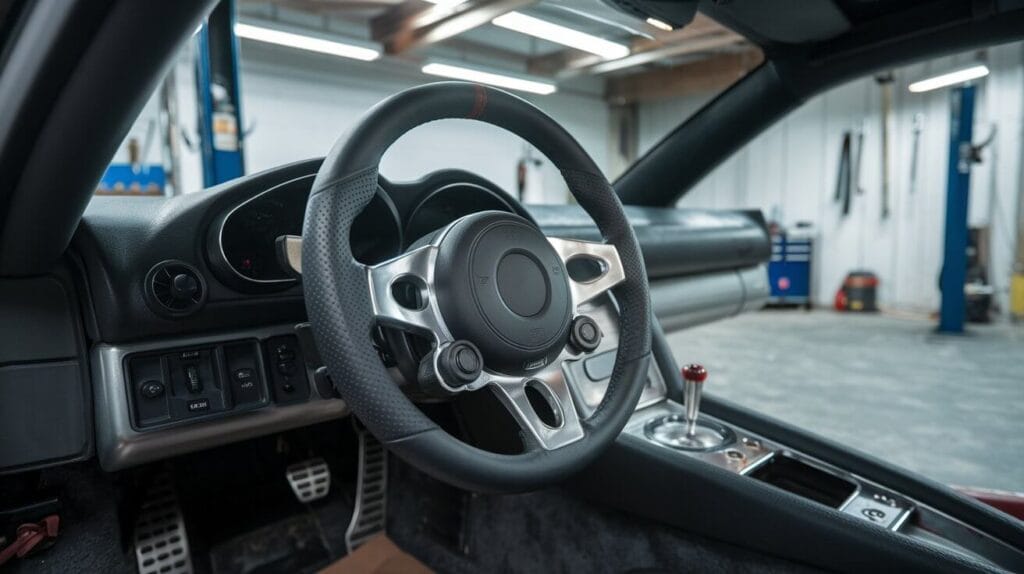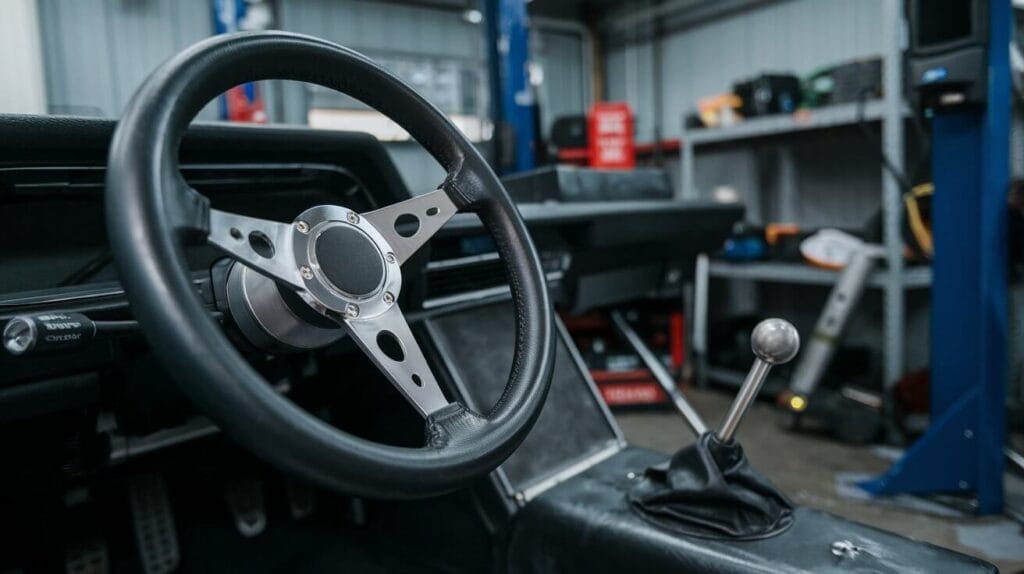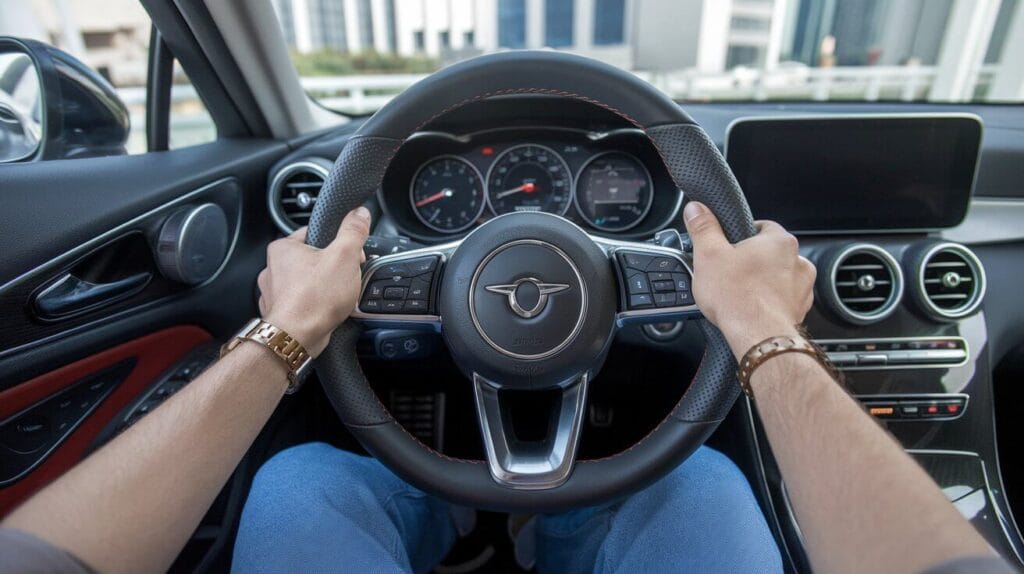The steering system in your car is essential for smooth and safe driving, especially on the busy roads of Dubai. It allows you to have complete control over your vehicle, ensuring precision whether you’re making a sharp turn or simply cruising straight. A malfunction in the steering system can compromise your safety and driving comfort. We know how important it is to catch these issues early. This guide will help you recognize the key signs of common steering problems and explain why professional diagnosis is crucial for keeping your vehicle safe.
6 Common Steering Problems in Dubai
In Dubai, steering issues can develop due to heat, heavy traffic and rough road conditions. Recognizing these problems early is essential to keep your car safe. Here are some of the most common steering problems drivers encounter:
1. Steering wheel vibrations:
- This issue often occurs when wheels are unbalanced or tires are misaligned. The vibrations are usually felt in the steering wheel, especially at high speeds. Not only does this make driving uncomfortable, but it also indicates that your tires or wheels need immediate attention to prevent further damage.
2. Stiff steering:
- When the steering wheel becomes hard to turn, it can signal low power steering fluid or a malfunctioning steering pump. This makes it difficult to manoeuvre the car, especially when parking or making tight turns. In Dubai’s hot climate, steering fluid can evaporate or degrade quickly, worsening the issue.
3. Loose or unresponsive steering:
- If your steering feels loose or lacks precision, it could be due to worn-out tie rods or ball joints. These components are crucial for maintaining control of the car. A loose steering system not only reduces handling but also increases the risk of accidents, especially on busy roads.
4. Pulling to one side:
- When your car veers to one side without turning the steering wheel, it’s often due to misaligned wheels, uneven tire pressure or brake issues. This problem can worsen over time, causing uneven tire wear and making it more difficult to control your vehicle, particularly at higher speeds.
5. Noisy steering:
- Clunking, squealing, or grinding noises when turning the wheel usually mean there’s a problem with the steering components or suspension. This could indicate worn parts like the steering rack or tie rods, which need to be repaired or replaced to avoid serious steering failures.
6. Delayed steering response:
- If there’s a noticeable lag between when you turn the steering wheel and when the car responds, this could point to issues with the power steering system or hydraulic leaks. Such delays make driving dangerous, especially in emergency situations when you need quick steering responses.
Addressing these common steering problems is essential for maintaining your vehicle’s safety and performance. Our team uses advanced tools and diagnostics to identify and fix these issues promptly. Regular maintenance and early detection can help prevent costly repairs and ensure your car stays safe on the road.
How Extreme Dubai Weather Affects Your Steering
Dubai’s extreme heat can significantly affect your car’s steering system. High temperatures cause power steering fluid to evaporate or degrade faster, leading to stiff or unresponsive steering. When fluid levels drop, it becomes harder to turn the wheel smoothly, especially when maneuvering in tight spaces or at lower speeds. Over time, the heat can also damage important components like the steering pump and hoses, making the system less effective.
Additionally, the intense weather conditions speed up the wear and tear of parts such as the steering rack, tie rods, and ball joints. These essential components can break down faster in the heat, leading to loose or imprecise steering. Tire pressure can also fluctuate in extreme heat, causing misalignment, which puts extra strain on the steering system. Regular checks and maintenance are vital to ensure your steering remains reliable, even in Dubai’s challenging climate.
5 Warning Signs to Watch for in Your Steering System
There are several clear warning signs that can indicate problems with your car’s steering system. Recognizing these early can help you avoid costly repairs and keep your car safe on the road.
-
Strange noises when turning:
- If you hear clunking, squealing or grinding sounds when you turn the steering wheel, it often means something is wrong. These noises could be due to worn-out parts like tie rods or the steering rack. Ignoring these sounds can lead to more serious damage over time.
-
Stiff steering wheel:
- If the steering wheel becomes hard to turn, this could be a sign of low power steering fluid or a failing steering pump. It can also happen if the steering belt is worn or damaged. This makes it difficult to move the car, especially at low speeds and can be dangerous in situations where quick steering is needed.
-
Loose or unresponsive steering:
- When your steering feels loose or doesn’t respond as it should, it could mean that components like the tie rods or ball joints are worn out. The loose steering makes it hard to control the car, increasing the risk of accidents, especially when driving at higher speeds.
-
Car pulling to one side:
- If your car veers to the left or right while you’re trying to drive straight, this could be due to misaligned wheels or uneven tire wear. In some cases, it could also point to a problem with the brakes or steering system. Driving with this issue can make controlling the vehicle harder and can cause tires to wear unevenly.
-
Delayed response when turning:
- If there’s a noticeable lag between when you turn the steering wheel and when the car reacts, it could indicate a problem with the power steering system or a hydraulic fluid leak. This delay reduces your ability to make quick turns, which can be dangerous in traffic or emergency situations.

Each of these warning signs suggests that your steering system needs attention. We use advanced diagnostics to pinpoint the problem and provide a solution, ensuring your car remains safe and reliable.
Why Diagnose Common Steering Problems Professionally
A professional diagnosis for your steering system is crucial to ensure your car remains safe and reliable. Trained mechanics have the tools and expertise to spot issues that might not be visible to the untrained eye. This includes detecting hidden damage, such as worn-out parts or leaks, that could affect the overall performance of your car’s steering system.
-
Precise problem detection:
- Trained professionals use specialized tools to identify the exact cause of the issue. This means nothing is overlooked, ensuring your steering is properly diagnosed.
-
Advanced tools and equipment:
- Mechanics use diagnostic machines that provide accurate readings, which cannot be achieved with DIY methods. This leads to a clearer understanding of what needs to be fixed.
- OBD-II scanners: These tools provide detailed fault codes related to the steering system, making it easier to diagnose electronic issues.
- Power steering pressure testers: Used to check for leaks or pressure problems within the power steering system.
- Laser wheel alignment tools: Ensures wheels are perfectly aligned, which is key for proper steering control.
- Hydraulic system analyzers: Help detect fluid pressure and flow issues in the steering system.
- Mechanics use diagnostic machines that provide accurate readings, which cannot be achieved with DIY methods. This leads to a clearer understanding of what needs to be fixed.
-
Preventing further damage:
- Attempting to repair steering issues without the proper knowledge can worsen the problem. A professional ensures the repair is done right the first time, preventing additional damage.
-
Time and cost savings:
- Getting the issue diagnosed and fixed correctly from the start avoids the risk of unnecessary repairs. This saves you time and money in the long run.
-
Confidence on the road:
- With a professional diagnosis, you can drive with peace of mind, knowing your car’s steering system is functioning as it should.

We offer thorough diagnostics to address all common steering problems efficiently, ensuring your car stays safe on the road. Trusting a professional guarantees the job is done right, keeping you and your vehicle in the best possible condition.
Professional Steering Diagnosis
We provide comprehensive services to diagnose and fix all common steering problems. Our team of expert mechanics uses advanced tools to ensure your steering system operates safely and smoothly. Here are the key services we offer:
-
Steering System Inspection:
- We perform a thorough check of the entire steering system, including the steering rack, tie rods, ball joints, and control arms, to identify any wear or damage that could affect handling.
-
Power Steering Fluid Check and Refill:
- Low or dirty power steering fluid can cause stiff steering. We inspect fluid levels, check for leaks, and refill or replace the fluid as needed.
-
Wheel Alignment:
- Misaligned wheels are the cause of common steering problems. Using laser wheel alignment tools, we correct any misalignment to ensure your car drives straight and doesn’t pull to one side.
-
Power Steering Pump and Hose Repair:
- If your steering feels stiff or unresponsive, it could be due to a failing power steering pump or leaking hoses. We diagnose and repair or replace these components to restore smooth steering.
-
Tie Rod and Ball Joint Replacement:
- Loose or unresponsive steering is often caused by worn-out tie rods or ball joints. We inspect these critical components and replace them if necessary to improve steering precision and control.
-
Steering Rack Repair:
- A damaged or leaking steering rack can lead to loss of control and steering fluid leaks. We inspect the rack and perform necessary repairs or replacements to ensure it functions properly.
-
Power Steering Pressure Test:
- We use power steering pressure testers to check for issues with fluid pressure, ensuring the system is working correctly without leaks or pressure drops.

By offering these tailored solutions, we ensure your car’s steering system is in top condition. Whether it’s a minor adjustment or a full repair, we provide everything you need to keep your car safe and easy to drive.
Preventive Tips to Avoid Common Steering Problems
Proper care of your steering system can help you avoid many common issues and ensure your car remains safe to drive. Here are detailed tips to prevent common steering problems:
- Check power steering fluid regularly: Low power steering fluid is one of the main causes of stiff or unresponsive steering. Make sure to check the fluid levels frequently and top it up if needed. If the fluid looks dirty or old, have it replaced to avoid damaging your steering components.
- Get regular wheel alignments: Misaligned wheels can strain your steering system and cause your car to pull to one side. Scheduling regular wheel alignments helps keep your vehicle driving straight and prevents uneven tire wear, which can also affect steering.
- Keep your tires properly inflated: Underinflated or overinflated tires can affect your car’s handling and place extra stress on the steering system. Check tire pressure regularly and ensure they are inflated to the recommended levels to reduce unnecessary strain.
- Inspect for unusual noises: If you hear clunking, squealing, or grinding noises when turning the wheel, it could be a sign of worn-out parts like tie rods or ball joints. Have your car inspected immediately to catch the problem before it worsens.
- Avoid rough driving: Potholes, curbs, and rough roads can damage steering components over time. Try to drive carefully, especially on uneven surfaces, to reduce wear and tear on your steering system.
- Monitor steering response: If you notice any delays or resistance when turning the wheel, it could mean there’s a problem with the power steering system or fluid pressure. Get it checked as soon as possible to prevent further damage.
- Schedule routine maintenance: During regular service appointments, have a mechanic check your steering system for any signs of wear or leaks. Early detection of small issues can prevent costly repairs down the line.
- Rotate your tires: Uneven tire wear can cause your car to handle poorly and put extra strain on the steering system. Rotating your tires regularly helps distribute wear evenly, improving your car’s handling.
By following these preventive measures, you can extend the life of your steering system and avoid unexpected breakdowns. Regular maintenance and careful driving are key to keeping your car’s steering responsive and safe.
Timely diagnosis of common steering problems is essential to keep your car safe and prevent bigger, more costly repairs down the road. Ignoring early signs can lead to serious damage, affecting your ability to control the vehicle. We provide expert steering system diagnostics and repairs to ensure your car stays reliable and easy to handle. Don’t wait for the problem to get worse. Book a professional diagnostic appointment with our auto repair garage today and drive with confidence on Dubai’s roads.
FAQs About Common Steering Problems
1. What are the most common steering problems in cars?
Several are most common steering problems in vehicles, including:
- Stiff steering: This is when the steering wheel becomes difficult to turn, usually caused by low power steering fluid or a faulty pump.
- Loose steering: When the steering feels unresponsive or too easy to turn, it often points to worn-out components like tie rods or ball joints.
- Pulling to one side: Misaligned wheels or uneven tire pressure can cause the vehicle to drift to one side without moving the steering wheel.
- Noises when turning: Clunking or squealing sounds during turns often indicate worn-out steering components or suspension issues.
These issues can lead to unsafe driving conditions if left unchecked.
2. Why is my steering wheel hard to turn?
A hard-to-turn steering wheel usually results from low or dirty power steering fluid. When fluid levels drop, the hydraulic pressure needed to assist steering is reduced, making it harder to control the car. It could also be caused by a malfunctioning steering pump or a worn-out belt. It’s important to have this issue checked immediately, as driving with stiff steering can be dangerous.
3. What causes the car to pull to one side while driving?
If your car is pulling to one side while you’re driving straight, it’s most likely due to:
- Wheel misalignment: This happens when your wheels are not angled correctly, causing uneven tire wear and pulling.
- Uneven tire pressure: If one tire has less air than the others, it can cause the car to veer off course.
- Brake issues: A sticking brake caliper can also pull your car to one side.
Getting a proper wheel alignment and checking tire pressure regularly can prevent this issue.
4. Why do I hear noises when turning the steering wheel?
Hearing noises such as clunking, squealing, or grinding when turning the steering wheel is often a sign of worn-out parts. These sounds are typically caused by:
- Worn tie rods: These connect your steering system to the wheels. When they wear out, you may hear clunking noises.
- Damaged ball joints: These help control the movement of your wheels. When they fail, they can cause squealing or grinding noises.
- Faulty steering rack: A steering rack that’s damaged or leaking fluid can also make turning noisy.
If you hear these sounds, it’s crucial to have your car inspected to prevent further damage.
5. How often should I check my power steering fluid?
You should check your power steering fluid at least once every few months or during routine maintenance. Low or dirty fluid can lead to stiff steering and damage your steering system over time. If you notice fluid levels dropping frequently, there may be a leak that needs to be addressed by a professional.
6. Can bad alignment affect my steering?
Yes, bad alignment can significantly impact your car’s steering system. Misaligned wheels can cause your car to pull to one side, making it harder to steer in a straight line. It also leads to uneven tire wear, which can worsen common steering problems. Regular wheel alignments ensure your car handles properly and reduces the strain on your steering components.
